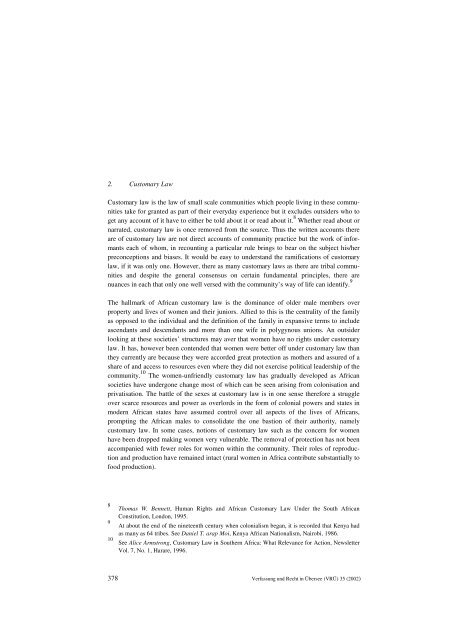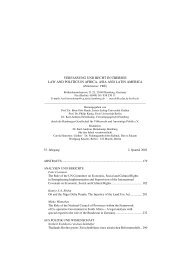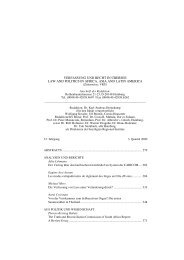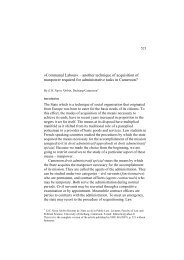Ganzes Heft zum Download (Pdf) - Zeitschrift Verfassung und Recht ...
Ganzes Heft zum Download (Pdf) - Zeitschrift Verfassung und Recht ...
Ganzes Heft zum Download (Pdf) - Zeitschrift Verfassung und Recht ...
Create successful ePaper yourself
Turn your PDF publications into a flip-book with our unique Google optimized e-Paper software.
2. Customary Law<br />
Customary law is the law of small scale communities which people living in these communities<br />
take for granted as part of their everyday experience but it excludes outsiders who to<br />
get any account of it have to either be told about it or read about it. 8 Whether read about or<br />
narrated, customary law is once removed from the source. Thus the written accounts there<br />
are of customary law are not direct accounts of community practice but the work of informants<br />
each of whom, in recounting a particular rule brings to bear on the subject his/her<br />
preconceptions and biases. It would be easy to <strong>und</strong>erstand the ramifications of customary<br />
law, if it was only one. However, there as many customary laws as there are tribal communities<br />
and despite the general consensus on certain f<strong>und</strong>amental principles, there are<br />
nuances in each that only one well versed with the community’s way of life can identify. 9<br />
The hallmark of African customary law is the dominance of older male members over<br />
property and lives of women and their juniors. Allied to this is the centrality of the family<br />
as opposed to the individual and the definition of the family in expansive terms to include<br />
ascendants and descendants and more than one wife in polygynous unions. An outsider<br />
looking at these societies’ structures may aver that women have no rights <strong>und</strong>er customary<br />
law. It has, however been contended that women were better off <strong>und</strong>er customary law than<br />
they currently are because they were accorded great protection as mothers and assured of a<br />
share of and access to resources even where they did not exercise political leadership of the<br />
community. 10 The women-unfriendly customary law has gradually developed as African<br />
societies have <strong>und</strong>ergone change most of which can be seen arising from colonisation and<br />
privatisation. The battle of the sexes at customary law is in one sense therefore a struggle<br />
over scarce resources and power as overlords in the form of colonial powers and states in<br />
modern African states have assumed control over all aspects of the lives of Africans,<br />
prompting the African males to consolidate the one bastion of their authority, namely<br />
customary law. In some cases, notions of customary law such as the concern for women<br />
have been dropped making women very vulnerable. The removal of protection has not been<br />
accompanied with fewer roles for women within the community. Their roles of reproduction<br />
and production have remained intact (rural women in Africa contribute substantially to<br />
food production).<br />
8<br />
Thomas W. Bennett, Human Rights and African Customary Law Under the South African<br />
Constitution, London, 1995.<br />
9<br />
At about the end of the nineteenth century when colonialism began, it is recorded that Kenya had<br />
as many as 64 tribes. See Daniel T. arap Moi, Kenya African Nationalism, Nairobi, 1986.<br />
10<br />
See Alice Armstrong, Customary Law in Southern Africa: What Relevance for Action, Newsletter<br />
378<br />
Vol. 7, No. 1, Harare, 1996.<br />
<strong>Verfassung</strong> <strong>und</strong> <strong>Recht</strong> in Übersee (VRÜ) 35 (2002)











